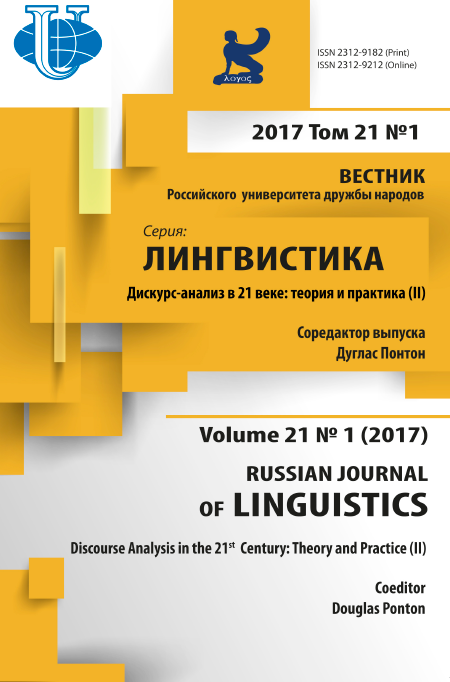Discourse Analysis in the 21st Century: Theory and Practice (II)
- Authors: Ponton D.M1, Larina T.V2
-
Affiliations:
- University of Catania
- Peoples’ Friendship University of Russia (RUDN University)
- Issue: Vol 21, No 1 (2017): Discourse Analysis in the 21 st Century: Theory an d Practice (II)
- Pages: 7-21
- Section: Articles
- URL: https://journals.rudn.ru/linguistics/article/view/15402
- DOI: https://doi.org/10.22363/2312-9182-2017-21-1-7-21
- ID: 15402
Cite item
Full Text
Abstract
About the authors
Douglas M Ponton
University of Catania
Email: mponton@hotmail.co.uk
Viva Cava Gucciardo Pirato, 97015 Catania, Italy
Tatiana V Larina
Peoples’ Friendship University of Russia (RUDN University)
Email: tatiana.larina@rudn.university
6 Miklukho-Maklaya str., 117198 Moscow, Russian Federation
References
- Арутюнова Н.Д. Метафора и дискурс. Теория метафоры. М.: Прогресс, 1990. С. 5-32. [Arutyunova, N.D. (1990). Metafora i diskurs. Teoriya metafory. Мoscow: Progress. 5-32. (In Russ).]
- Баранов А.Н., Плунгян В.А., Рахилина Е.В. Путеводитель по дискурсивным словам русского языка. М.: Помовский и партнеры, 1993. [Baranov A.N., Plungian V.A., Rakhilina E.V. (1993). Putevoditel' po diskursivnym slovam russkogo yazyka. Moscow: Pomovskii i Partnery. (In Russ).]
- Будаев Э.В., Чудинов А.П. Метафора в политическом интердискурсе: монография. Екатеринбург: Урал. гос. пед. ун-т, 2006. [Budaev E.V., Chudinov A.P. (2006). Metafora v politicheskom interdiskurse. Ekaterinburg: Ural. gos. ped. un-t. (In Russ).]
- Иванова С.В., Сподарец О.О. Реализация стратегия субъективизации в структуре новостного политического дискурса СМИ // Политическая лингвистика. 2010. № 3. С. 71-75. [Ivanova S.V., Spodarets O.O. (2010). Implementation of Subjectivization Strategy in the Structure of Mass Media Political Discourse, Political Linguistics Journal, 3, 71-75. (In Russ).]
- Кечкеш И. Слово, контекст и коммуникативное значение // Вестник Российского университета дружбы народов. Серия: Лингвистика. 2014. № 1. С. 7-18. [Kecskes, I. (2014). Word, context and communicative meaning. Russian Journal of Linguisitcs. Vestnik RUDN. 1, 7-18. (In Russ).]
- Кибрик А.А. Модус, жанр и другие параметры классификации дискурсов. Вопросы языкознания. 2009. http://iling-ran.ru/kibrik/Discourse_classification@VJa_2009.pdf [Kibrik A.A. (2009). Modus, zhanr i drugie parametry klassifikatsii diskursov. Voprosy yazykoznaniya (In Russ).]
- Кубрякова Е.C. В поисках сущности языка: Когнитивные исследования. Институт языкознания РАН. М.: Знак, 2012. [Kubryakova E.S. V poiskakh sushchnosti yazyka. Kognitivnye issledovaniya. Moscow: Znak, 2012. (In Russ).]
- Кубрякова Е.С. Язык и знание. На пути получения знаний о языке: части речи с когнитивной точки зрения. Роль языка в познании мира. Институт языкознания РАН. М.: Языки славянской культуры, 2004. (Язык. Семиотика. Культура). [Kubryakova E.S. Yazyk i znaniye: Na puti polucheniya znanij o yazyke: Chasti rechi s kognitivnoj tochki zreniya. Rol’ yazyka v poznanii mira. Moscow: Yazyki Slavyanskikh Kultur, 2004. (In Russ).]
- Пономаренко Е.В. Функциональная системность дискурса (на материале английского языка). М.: 2004. [Ponomarenko E.V. (2004). Funktsional'naya sistemnost' diskursa (na materiale angliiskogo yazyka). Moscow. (In Russ).]
- Синельникова Л. Дискурсивная семантика русских местоимений: Коммуникативные сценарии в прозе и в поэзии. Palmarium Academic Publishing. 2013. [Sinel'nikova L. (2013). Diskursivnaya semantika russkikh mestoimenii: Kommunikativnye stsenarii v proze i v poezii. Palmarium Academic Publishing. (In Russ).]
- Чернявская В.Е. Дискурс власти и власть дискурса: Проблемы речевого воздействия. М.: Флинта, 2012. [Chernyavskaya V.E. (2012). Diskurs vlasti i vlast' diskursa: Problemy rechevogo vozdeistviya. Moscow: Flinta. (In Russ).]
- Чудинов А.П. Россия в метафорическом зеркале: когнитивное исследование политической метафоры (1991-2000). Екатеринбург, 2001. [Chudinov A.P. (2001). Rossiya v metaforicheskom zerkale: kognitivnoe issledovanie politicheskoi metafory (1991-2000). Ekaterinburg. (In Russ).]
- Alba-Juez, Laura and J.Lachlan Mackenzie. (2016). Pragmatics: Cognition, Context and Culture. Madrid: McGraw-Hill
- Bednarek, M. 2008 Emotion Talk across Corpora. London/New York: Palgrave Macmillan
- Berman, R.A. (2004). Introduction: developing discourse stance in different text types and languages. Journal of Pragmatics. No. 37, 105-124
- Burgoon, J.K., & Qin, T. (2006). The Dynamic Nature of Deceptive Verbal Communication. Journal of Language and Social Psychology, 25(1), 76-96
- Burgoon, J.K., Hamel, L., & Qin, T. (2012). Predicting Veracity from Linguistic Indicators. Intelligence and Security Informatics Conference (EISIC), European. 323-328
- Fairclough, N. (2001). Critical discourse analysis as a method in social scientific research. In: Methods of Critical discourse analysis. London: Thousand oaks and Delhi: Sage. 121-139
- Fairclough, N. (2010). Critical Discourse Analysis: The critical discourse analysis. London: Longman
- Gibbons, J. (2003). Forensic Linguistics: An Introduction to Language in the Justice System
- Langacker, R.W. (2000). Grammar and conceptualization. Berlin; New York: Mouton de Gruyter
- Lakoff, G. and Johnsen, M. (2003). Metaphors we live by. London: The university of Chicago press
- Leech, G. (2014). The pragmatics of politeness. Oxford Studies in Sociolinguistics. Oxford
- Leontiev, A.A. (2006a). Psycholinguistic units and speech generation. Journal of Russian and East European Psychology. 44 (4). 7-88
- Leontiev, A.A. (2006b). Units and levels of activity. Journal of Russian and East European Psychology. 44 (3), 30-46
- Martin, J.R. & D. Rose (2003) Working with Discourse: meaning beyond the clause. London: Continuum. [2nd revised edition 2007]
- Martin, J.R. and P.R.R. White. (2005). Language of Evaluation: Appraisal in English. Palgrave Macmillan
- Martin, J.R. & D. Rose (2008). Genre Relations: mapping culture. London: Equinox
- Martin, J.R (2013). Systemic Functional Grammar: a next step into the theory - axial relations. (Chinese translation and extensions by Wang Pin & Zhu Yongsheng). Beijing: Higher Education Press
- Musolff, A. (2016). Political Metaphor Analysis: Discourse and Scenarios. Bloomsbury Publishing
- Ponton, D. (2016). Movement and meaning: towards an integrated approach to political discourse analysis. Russian Journal of Linguistics, 20 (4)
- Van Dijk, T. (2006). Discourse and manipulation. Discourse & Society. 17 (2), 359-383
- Van Dijk, T. (2009). Society and discourse. How social contexts influence text and talk. Cambridge: Cambridge University Press
- Weiss, G., Wodak, R. (eds.) (2007). Critical discourse analysis: theory and interdisciplinarity. London, Basingstoke, New York: Palgrave, Macmillan
- Wierzbicka, A. (1991/2003). Cross-Cultural Pragmatics: The Semantics of Human Interaction. Berlin: Mouton de Gruyter
- Wodak, R. (2007). Critical discourse analysis. Qualitative research practice. London: Sage. 185-201
Supplementary files















